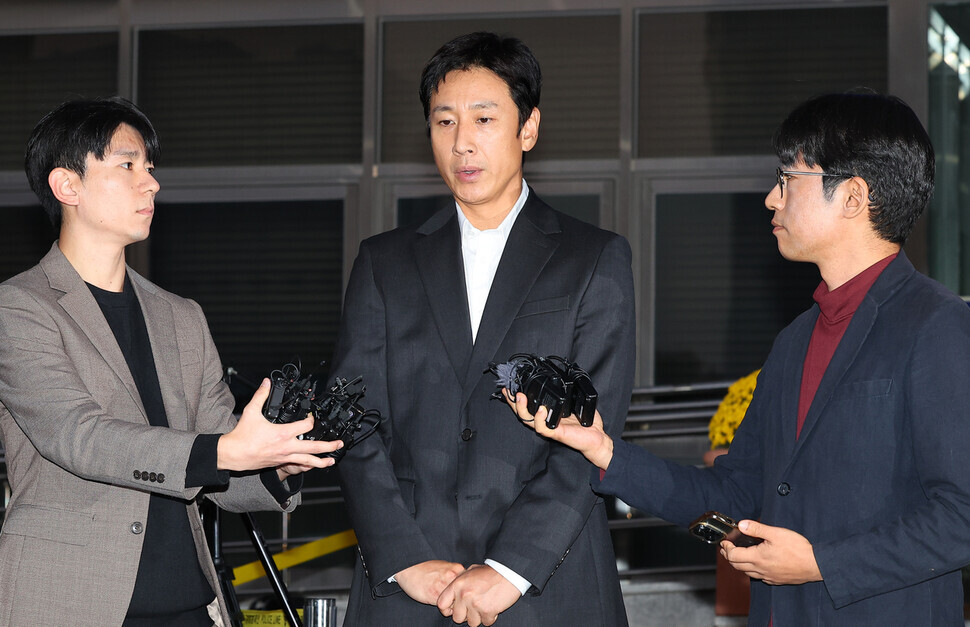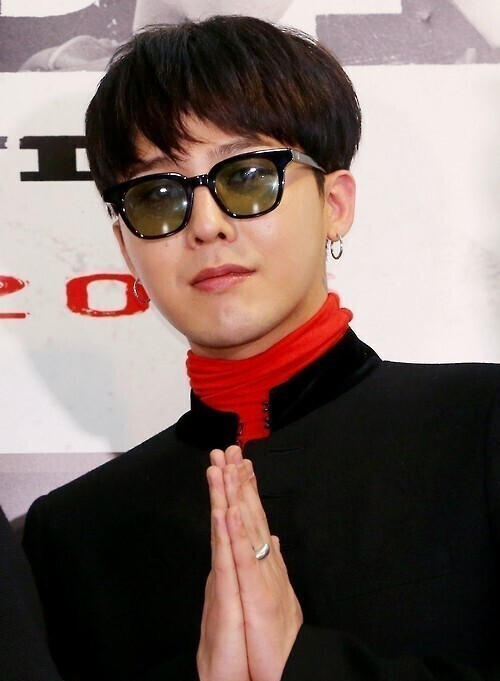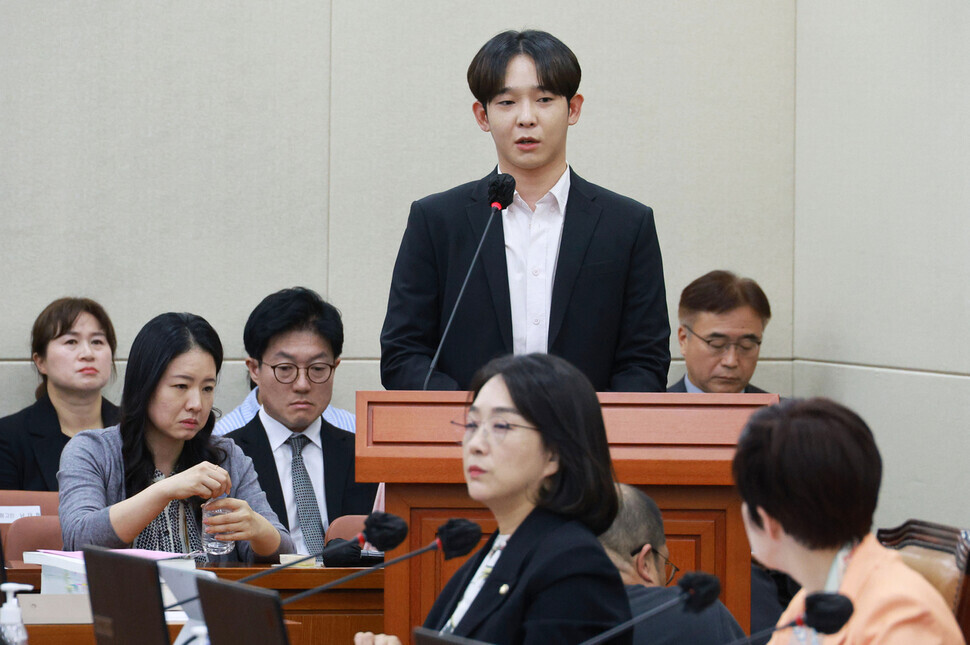hankyoreh
Links to other country sites 다른 나라 사이트 링크
Alleged drug use by Korean A-listers rocks nation – but not for the first time

On Oct. 19, an article went online with the title “Top star ‘L’ under investigation on drug charges.” Not long afterward, “L” was identified as actor Lee Sun-kyun.
Nine days after the report, Lee appeared at the Nonhyeon Police Station in Incheon on Oct. 28. It was the first time he’d been seen since the drug use allegations had been made public. Lee took a simple drug test, which came out negative.
He is alleged to have used narcotics at the home of a manager at a nightlife business. He has also filed an extortion complaint against the manager in question, claiming he was threatened into handing over around 350 million won, or around US$268,000.
On Oct. 25, singer G-Dragon of the group BigBang was booked on drug use charges. Through his lawyer, he asserted that he had never used narcotics. He was scheduled to appear for questioning on Monday.
Incidents of drug use by entertainers have recently been drawing major public attention with the numerous big names at the center of scandal. There have also been many instances of fake news and unverified lists of “entertainers on drugs” circulating.

The situation has spread to affect the political world as well. In a Sept. 21 Facebook post, Democratic Party deputy spokesperson Lee Kyung asked, “Are they trying to cover things over with articles about ‘celebrities using drugs’?”
“The daughter of secretary Kim Seung-hee, a Korea University executive program classmate of [first lady] Kim Keon-hee, is a perpetrator of school bullying who inflicted injuries requiring nine weeks of treatment,” she continued. “People are demanding that President Yoon Suk-yeol take responsibility for pardoning and reinstating Kim Tae-woo and having him run in the election for leader of [Seoul’s] Gangseo District Office, yet those stories are being covered over with allegations of ‘drug use by actor Lee Sun-kyun.’”
In an Oct. 26 appearance on the YTN radio program “News King Park Ji-hoon,” Democratic Party lawmaker An Min-suk said, “I have to wonder if I’m reading too much into things and it’s all just a coincidence that this ‘celebrity drug issue’ is blowing up at a time when the administration is in crisis.”
“It’s the sort of timing that can give rise to the misunderstanding that someone may have intended and orchestrated it,” he said, while adding that he had “no basis” for making such claims.
During a parliamentary audit by the National Assembly Legislation & Judiciary Committee the same day, People Power Party lawmaker Cho Su-jin asked Minister of Justice Han Dong-hoon if there were any grounds supporting An’s remarks.
“Drugs know nothing of politics. It’s really like a disease,” Han replied.
The reason the celebrity drug allegations and incidents are stirring up conspiracy theories is because of South Korea’s history, where dictatorships in past eras exploited drug-related issues to redirect the public’s political attention.
In late 1975, a scandal erupted over entertainers using marijuana. It happened to come in a year when public sentiments had soured over then-President Park Chung-hee invoking the ninth of his Emergency Measures that May. Inflation was also soaring amid the effects of an oil crisis.
That December, folk singers including Yoon Hyung-joo and Lee Jang-hee were arrested on charges of violating the Habit-Forming Medicines Control Act. The law in question specifically regulated pharmaceuticals and cannabis, while not including other forms of narcotics. Soon afterward, Shin Joong-hyun and Kim Choo-ja were arrested on the same charges.
In 1976, Park explicitly mentioned marijuana during an early-year inspection of the Ministry of Justice.
“It is a disgrace to the country that young people are smoking marijuana at such a crucial life-or-death moment as we battle the Communist Party,” he said at the time, issuing orders to “apply the maximum penalties according to the law.”
That year, singer Cho Yong-pil had broken out as a star with his song “Come Back to Busan Harbor.” But after being charged with smoking pot the following year, he was barred from appearing in broadcasts.
By 1977, a total of 137 entertainers had been arrested or booked. Among the figures caught up in the “cannabis scandals” were such luminaries as Kim Jung-ho, Jung Hoon-hee, Nam Jin, Jang Hyun, Kim Se-hwan, Lim Hee-sook, and Kim Do-hyang.
The Habit-Forming Medicines Control Act had gone into effect in November 1970. During the 1960s, Shin Joong-hyun had undergone brief questioning and paid a fine with a summary indictment for cannabis use; under the newly enacted law, the Park administration retroactively applied charges and placed him under arrest.
In a 2006 interview with the New York Times, Shin recalled a telephone call by a “caller identifying himself as an official in the presidential Blue House,” who pressed him to write a song for Park. He refused, as he had no interest in politics and despised the dictatorship.
“His refusal, he believed, eventually led to his imprisonment for drug possession,” the interview said.

Not all celebrity drug stories can be put down to conspiracy theories. The celebrities who have gotten mixed up with drugs have faced criticism for letting down their fans.
Singer Jun In-kwon was arrested five times between 1987 and 2008. In 1987 and 1992, he was charged with smoking cannabis; in 1997, 1999, and 2008, he was charged with taking methamphetamine.
Kim Tae-won, the lead singer of the rock group Boohwal, was booked on marijuana use charges once in 1987 and then again in 1991.
During the 1990s, singer Lee Seung-chul, actor Park Joong-hoon, and comedian Shin Dong-yup were arrested for pot use. In the 2000s, singers Kang San-eh and PSY were caught using the drug.
In 2004, actor Kim Bu-seon petitioned for a constitutionality hearing, contending that it was a violation of the right to pursue happiness according to the Constitution to prevent people from smoking marijuana. Her case was dismissed by the court.
More recently, a number of entertainers were found to be chronic users of the anesthetic propofol. Television personality Amy Lee and actors Lee Seung-yeon and Park Si-yeon were referred to trial on charges of illegally using propofol on a regular basis for cosmetic procedures and pain treatment.
This year has seen drug use allegations against singer Don Spike and actor Yoo Ah-in.
Drug use is said to be becoming increasingly popularized in Korea, but entertainers are more likely to be exposed to it. According to analysts, some turn to narcotics as a way of relieving the extreme stress associated with maintaining their life and popularity in the public eye, while other celebrities end up addicted to drugs like propofol that they encounter while visiting plastic surgeons and dermatologists as part of their appearance management.
Also cited as a factor in the continued emergence of cases involving celebrities using drugs is the fact that the career consequences when they are caught tend not to be too severe, and they are often able to come back after a time.
In some cases, the recovery process has been more of a struggle.
Last month, Nam Tae-hyun (formerly of boy group Winner) appeared before the National Assembly’s Health and Welfare Committee during a parliamentary audit to testify after being indicted on charges of methamphetamine use. Nam currently resides in a substance rehabilitation facility in Incheon.
“I had been taking psychiatric meds due to severe depression, and when I felt like I had reached rock bottom, I began using pot and eventually ended up doing meth,” he said before the committee. Commenting that the rehab facility he is currently staying in is “inadequate in terms of space, to the point it can only admit 20 people,” Nam pleaded for government support.
In a post uploaded to his Instagram page later that day, Nam wrote, “Drugs are a virus that spreads, but treatment and rehab are a vaccine. One addict can spawn a thousand more addicts, but it’s important to remember that a single recovered person can help many addicts recover as well.”
By Jung Hyuk-june, staff reporter
Please direct questions or comments to [english@hani.co.kr]

Editorial・opinion
![[Column] Life on our Trisolaris [Column] Life on our Trisolaris](https://flexible.img.hani.co.kr/flexible/normal/500/300/imgdb/original/2024/0505/4817148682278544.jpg) [Column] Life on our Trisolaris
[Column] Life on our Trisolaris![[Editorial] Penalties for airing allegations against Korea’s first lady endanger free press [Editorial] Penalties for airing allegations against Korea’s first lady endanger free press](https://flexible.img.hani.co.kr/flexible/normal/500/300/imgdb/original/2024/0502/1817146398095106.jpg) [Editorial] Penalties for airing allegations against Korea’s first lady endanger free press
[Editorial] Penalties for airing allegations against Korea’s first lady endanger free press- [Editorial] Yoon must halt procurement of SM-3 interceptor missiles
- [Guest essay] Maybe Korea’s rapid population decline is an opportunity, not a crisis
- [Column] Can Yoon steer diplomacy with Russia, China back on track?
- [Column] Season 2 of special prosecutor probe may be coming to Korea soon
- [Column] Park Geun-hye déjà vu in Yoon Suk-yeol
- [Editorial] New weight of N. Korea’s nuclear threats makes dialogue all the more urgent
- [Guest essay] The real reason Korea’s new right wants to dub Rhee a founding father
- [Column] ‘Choson’: Is it time we start referring to N. Korea in its own terms?
Most viewed articles
- 160% of young Koreans see no need to have kids after marriage
- 2Presidential office warns of veto in response to opposition passing special counsel probe act
- 3New sex-ed guidelines forbid teaching about homosexuality
- 4Months and months of overdue wages are pushing migrant workers in Korea into debt
- 5OECD upgrades Korea’s growth forecast from 2.2% to 2.6%
- 6[Guest essay] Maybe Korea’s rapid population decline is an opportunity, not a crisis
- 7[Column] Life on our Trisolaris
- 8Another chaebol heir caught smuggling liquid marijuana into South Korea
- 9S. Korea discusses participation in defense development with AUKUS alliance
- 10Bills for Itaewon crush inquiry, special counsel probe into Marine’s death pass National Assembly